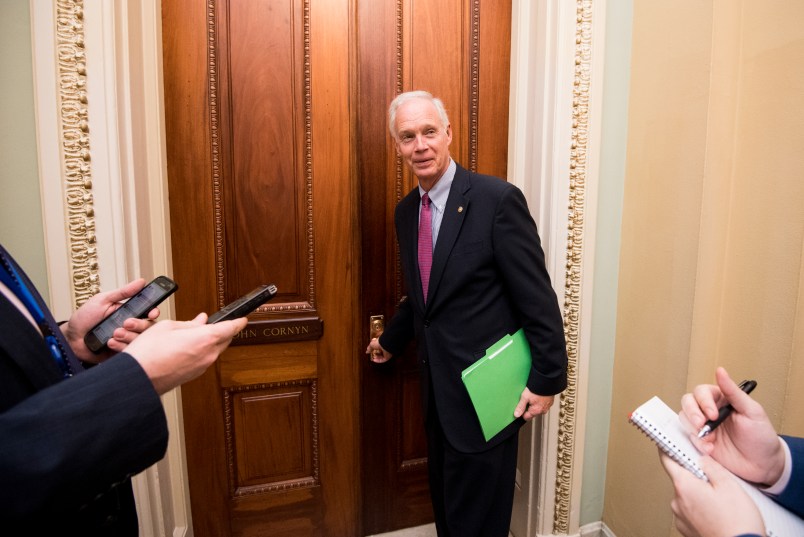Sen. Ron Johnson (R-WI) proclaimed on Twitter Wednesday that he’s “going to make the Senate clerk read the Democrats’ $1.9 trillion bill. All several hundred pages of it.”
Johnson estimated that it’ll take 10 hours to read through the whole COVID-19 relief package. It clocks in at 630 pages.
Luckily, the clerks who will be forced to carry out that stalling tactic have a plan.
“We can read two pages a minute,” Mary Anne Clarkson, senior assistant legislative clerk, told TPM matter-of-factly. “It won’t take 10 hours.”
She would know — she and John Merlino, the head Senate legislative clerk, are in charge of reading aloud bills, resolutions and amendments on the floor, along with calling the roll for quorums and votes.
If it gets really long — “four or five hours,” she said — they may bring in the head Senate bill clerk and her senior assistant for backup. They sometimes help out with roll call votes.
Even after the clerks tear through the bill, Johnson and his fellow Republicans plan to drag out the expected passage of the COVID-19 relief package by introducing a plethora of amendments aimed to split the Democratic caucus and to produce fodder for campaign ads later on. He told reporters Thursday that he’s setting up three sign-up shifts to ensure that hundreds of amendments get voted on.
“We all know this will merely delay the inevitable,” Senate Majority Leader Chuck Schumer (D-NY) said on the floor Thursday. “It will accomplish little more than a few sore throats for the Senate clerks who work very hard day in day out to help the Senate function. And I want to thank our clerks profoundly for the work they do every day, including the arduous task ahead of them.”
He added that he was “delighted” to give the American people another chance to hear what’s in the relief package.
It’s far from the first time Senate staff has had to bear the brunt of lawmakers’ stalling moves. In 2017, it was Democrats who forced the reading of a 178-page bill to repeal the Affordable Care Act, an effort that would boot millions off of their health care.
In that case, though, the Democrats hadn’t actually seen the Republicans’ bill yet, and they took mercy on the clerk before he finished, cutting the reading short.
Not every clerk is so lucky.
As part of a filibuster, then-Sen. Mike Gravel (D-AK) once forced the clerk to read an amendment to a bill about Alaskan lands, which was replete with names that the clerk struggled to pronounce.
“Naturally, the poor clerk was stumbling over the names and struggling to keep from breaking into laughter over his own travails,” Richard Arenberg, interim director at Brown University’s Taubman Center for American Politics and Policy, wrote about the episode in his book. “Down the center aisle came an obviously agitated Majority Leader Robert Byrd. In a none-too-subtle stage whisper heard, no doubt, by all in the gallery, he cried, ‘Will you cut that out?’”
The poor clerk was stuck on the floor until he finished reading.
This time, Republicans will draw out the bill stuffed with critical COVID-19 aid as long as possible to try to bolster their complaints that the package is bloated with what they describe as unnecessary measures. Johnson has called it “abuse,” a “boondoggle” for Democrats.
Democrats need to know, Sen. Mitt Romney (R-UT) told reporters Thursday, that when they “lard up a piece of legislation that we’re not just gonna sit back and take it, we’re gonna fight back.”
After the vote to proceed with the bill, expected to come this afternoon, there will be some procedural motions and hours of Johnson’s forced bill read. Then there will be 20 hours of debate before the “vote-a-rama,” when the senators will introduce their amendments, many of which will be just for show.
Senate Republicans are hoping to force their Democratic peers into uncomfortable amendment votes to use on the campaign trail later. While it only takes 51 votes to pass the amendments, Schumer can introduce a final amendment at the end that would strip the bill of any changes.
“It’s all about TV commercials,” Sen. John Cornyn (R-TX) told CNN. “Make people accountable for their votes. There is not much they can do if they are determined to hang together there is nothing we can do to change the outcome. If they really want to do this, they can probably get it done.”
Democrats are eager to get the package passed as soon possible, especially because of the March 14 cliff when millions of Americans will start losing their federal unemployment benefits.



